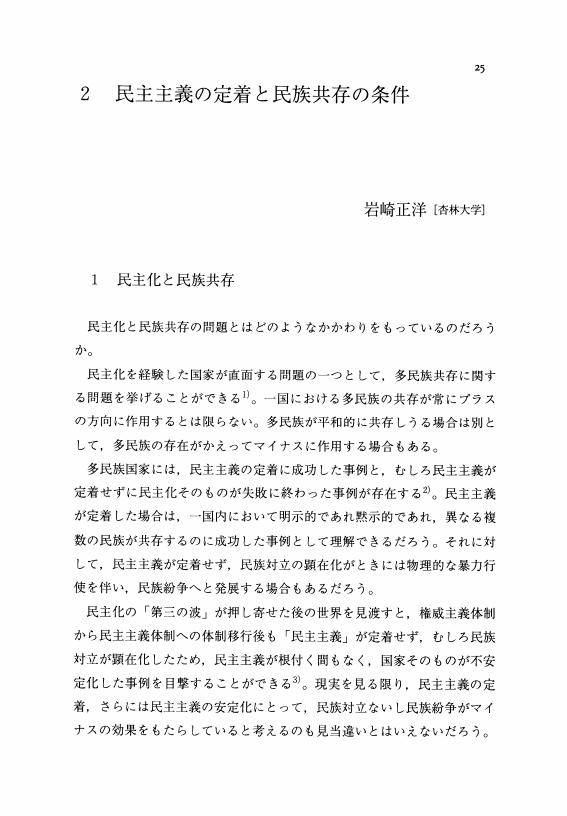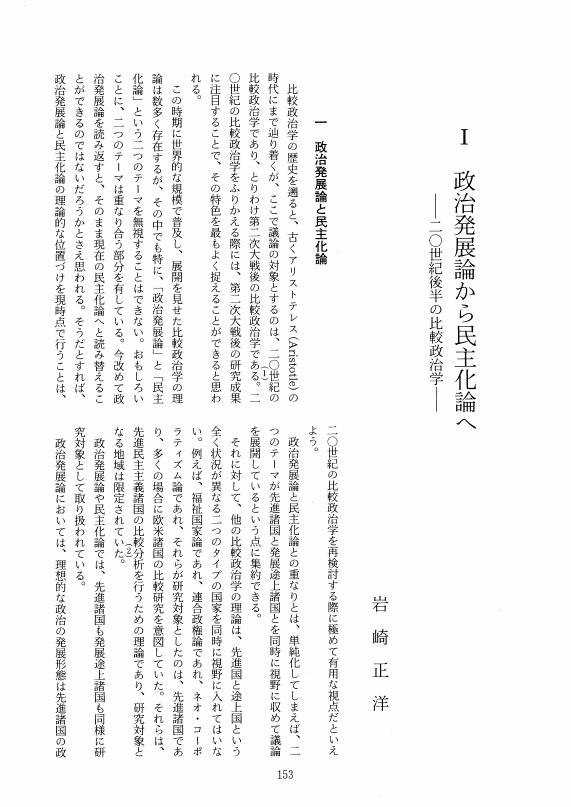2 0 0 0 OA 2 民主主義の定着と民族共存の条件
- 著者
- 岩崎 正洋
- 出版者
- 日本比較政治学会
- 雑誌
- 日本比較政治学会年報 (ISSN:21852626)
- 巻号頁・発行日
- vol.3, pp.25-46, 2001-06-20 (Released:2010-09-09)
- 参考文献数
- 42
1 0 0 0 OA 政治発展論から民主化論へ
- 著者
- 岩崎 正洋
- 出版者
- JAPANESE POLITICAL SCIENCE ASSOCIATION
- 雑誌
- 年報政治学 (ISSN:05494192)
- 巻号頁・発行日
- vol.50, pp.153-166, 1999-12-17 (Released:2009-12-21)
1 0 0 0 OA CHAPTER 3 政党政治とデモクラシーの変容
- 著者
- 岩崎 正洋
- 出版者
- 日本比較政治学会
- 雑誌
- 日本比較政治学会年報 (ISSN:21852626)
- 巻号頁・発行日
- vol.17, pp.57-78, 2015 (Released:2020-03-16)
- 参考文献数
- 10
1 0 0 0 OA 大統領制化と政党政治のガバナンス
- 著者
- 岩崎 正洋
- 出版者
- 日本政治学会
- 雑誌
- 年報政治学 (ISSN:05494192)
- 巻号頁・発行日
- vol.65, no.2, pp.2_91-2_109, 2014 (Released:2018-02-01)
- 参考文献数
- 37
In this article, we focus on a relationship between presidentialization and party politics. Especially, we pay attention to the governance of party politics. According to Thomas Poguntke and Paul Webb, phenomenon of presidentialization “denominates a process by which regimes are becoming more presidential in their actual practice without, in most cases, changing their formal structure, that is, their regime type.” They refer to as three faces of presidentialization, that is, (1) the executive face, (2) the party face, and (3) the electoral face. These faces are complementary in the democratic governance. In this paper, the phenomenon of presidentialization means the governance of party politics. There are two types of governance by political parties. One is “governance in the party” and another one is “governance among the parties.” It is useful for us to understand the changes of party politics by using the concepts of “governance in the party” and “governance among the parties.”
1 0 0 0 OA COVID-19と公共政策学
- 著者
- 岩崎 正洋
- 出版者
- 日本公共政策学会
- 雑誌
- 公共政策研究 (ISSN:21865868)
- 巻号頁・発行日
- vol.20, pp.87-97, 2020-12-10 (Released:2021-10-02)
- 参考文献数
- 34
2020年は,世界中がCOVID-19の感染拡大に直面した年として,後々まで語り継がれることになるであろう。我々の日常は大きく変化し,これまでの当り前が当たり前ではなくなり,以前とは明らかに異なる「新しい日常」が求められるようになった。まさに,社会のさまざまな側面が変化から逃れることはできなかった。COVID-19の登場により,人類が経験した新しい現象は,まさに公共的な問題であり,その問題解決のためには,公共政策による取り組みが必要になる。それゆえ,公共政策学の研究領域にCOVID-19が含まれることになり,新たな研究対象として位置づけられることとなった。そこで,本稿は,公共政策学の研究において,COⅥD-19を取り扱うには,どのような見方があるか,どのような見方が必要かという点について考えることを目的とする。本稿では,とりわけ,日本におけ,る2020年1月から5月までの感染拡大の「第一波」の時期に焦点を向け,政策過程論的アプローチと比較政治学的アプローチという二つの点から議論を進めていく。その意味で,本稿は,公共政策学における研究対象として,COVID-19を取り扱う際の論点抽出の役割を果たすものとして位置づけられる。
1 0 0 0 OA 連合政権の安定性と政党システムの理論
- 著者
- 岩崎 正洋
- 出版者
- Japanese Association of Electoral Studies
- 雑誌
- 選挙研究 (ISSN:09123512)
- 巻号頁・発行日
- vol.8, pp.85-101,164, 1993-05-30 (Released:2009-01-22)
- 参考文献数
- 77
As Maurice Duverger pointed out, proportional representation tends to lead to the formation of many independent parties. Traditionally, analysis of the consequences of electoral systems and party systems has focused upon two central topics: the influence of the electoral system upon the number of effective parties, and its effects upon the political stability of a country. Political stability in this context means ‘cabinet durability.’In Western Europe, many countries have been governed by coalition governments. And they have experienced stable government. In Japan, however, there are many misconceptions about coalition government, namely that coalition government is unstable. It is not the case in European politics. Consequently, this paper aims at discussing the relations in terms of the ‘durability of coalition government and party systems.’Michael Laver and Norman Shofield analyzed government duration and the effective number of parties, by country, from 1945 to 1987. In their comparative study of coalition governments, coalition stability varies very considerably from regime to regime. It seems that cabinet duration is more likely to rise than to fall when the size of the party system increases. While the size of the party systems in Finland, Luxenburg, and Iceland went up between the periods from 1945-71 and from 1971-87, cabinet stability also rose. Only in the interesting cases of Belgium, Sweden, and Denmark we see clear evidence of the Japanese misunderstanding about the relation between cabinet stability and the size of the party system.Nevertheless, in terms of the study of ‘coalition government, ’ there is at present, no systematically arranged condition. What relationship do party systems have to government stability? As the coalition is formed and is stabilized, what type of cabinet emerges, and in what country can we see that type? What are the relationship between social cleavages, left-right ideology and coalition government? Social cleavages and left-right ideology often determine party systems. In real world politics, what type of coalition is most frequently formed, and how long does it remain stable? It seems that by synthesizing various theories, it will become possible to understand the answers to these questions.Turning our attention to the Japanese case, it seems that the past research has concentrated on the formation of coalition government rather than on its stability. In that sense, it is necessary now to discuss coalition theories in terms of cabinet stability.We try to answer the question as to why some cabinets last longer than others, any why cabinets in some countries tend to last longer than those in other countries. In general, one-party cabinets are said to be more durable than coalition cabinets, minimal winning cabinets are said to be more durable than oversized ones. and cabinets in systems with two or relatively few parties are said to be more durable than cabinets in multiparty systems.Thus, we have briefly viewed the stability of coalition government and party systems. However, we must consider further the problem of public policy. If the stability of coalition relates to the stability of party system, it is necessary to maintain a coalition government by havig it correspond to people's demands and absorb people's support. Effective public policy is a useful means for achieving this end.What policy will be offered? When? And what combination will be formed? Given this potential importance of public policy, it seems that we must pay attention to the relationship between individual political parties and public policies.
1 0 0 0 政治における不祥事と利益誘導政治
- 著者
- 岩崎 正洋
- 出版者
- 日本大学
- 雑誌
- 政経研究 (ISSN:02874903)
- 巻号頁・発行日
- vol.48, no.1, pp.27-46, 2011-07-25


